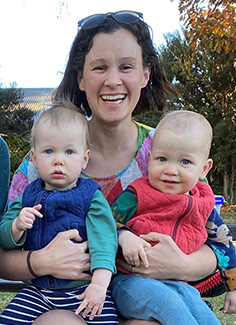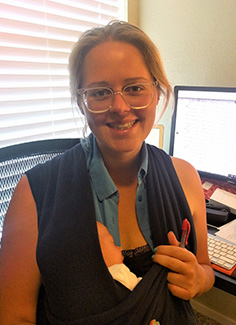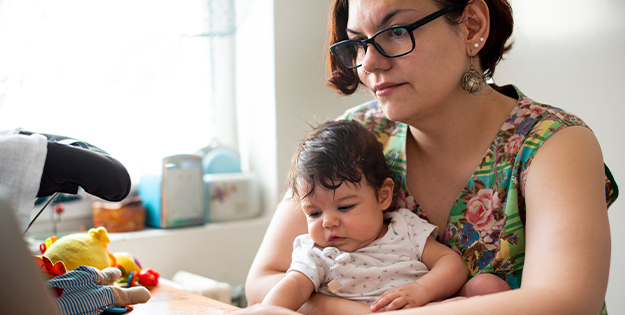Career
Copyright@ Australian Catholic University 1998-2026 | ABN 15 050 192 660 CRICOS registered provider: 00004G | PRV12008
Copyright@ Australian Catholic University 1998-2026 | ABN 15 050 192 660 CRICOS registered provider: 00004G | PRV12008

Dr Evelyn Parr is an exercise and nutrition researcher and well known for her work on time-restricted eating. She is also a mother of young twins. While she is passionate about her job, it isn’t always easy to manage her research career with the demands of family life.
“Research isn’t a nine to five job. I've seen many female friends leave research or not choose research because of the perceived difficulties of having a job and a family,” said Dr Parr.
To succeed, she said, it takes a certain amount of perseverance, a lot of passion and, of course, planning, “And then, having more plans for when things don't go to plan.”
Some days Dr Parr is up and in the lab before the twins wake. On other days she’ll leave work by 4pm to spend time with them before logging back on to work into the evening. Having an employer who understands the challenges helps.
“ACU is amazing. I am lucky to have a flexible work arrangement where I work from home two days a week, it saves on commuting which affords me writing time.”
When Dr Parr returned to work after parental leave, she discovered colleagues had, perhaps unconsciously, preconceived ideas of what she could and couldn’t do as a working parent. People have said, 'I didn't ask you to do that, because I know you're busy' or 'I assumed you couldn't do such a task or event because of your limited time.'

But I would rather be consulted and make the decision myself.”
While the overall percentage of female researchers is slowly increasing, a study by the Australian Research Council (ARC) shows that women are outnumbered by men in 17 out of 22 disciplines, and male professors outnumber female professors three to one.
“And the higher you go, the less females there are. Much of that is due to societal norms around care giving,” said Dr Parr.
Dr Kristie Patricia Flannery, a research fellow in ACU’s Institute for Humanities and Social Sciences and mother of two, says it’s not unusual for leading scholars to work more than 50 hours a week to meet their teaching, grant application, research and writing responsibilities.
“Most women scholars recognise that a lot of the men devoting themselves so fully to academic work have a woman behind them raising their children and taking care of their household,” said Dr Flannery.
“It's really quite daunting to realise that I am not going to be able to put in as many hours as my peers if I want to also be a present and engaged parent.”
Her solution is to “Make hay while the sun shines.”
“Having a more limited number of work hours in my week means that I use those hours very efficiently.
“I have learned to work smarter, be strategic about what I say yes to and be comfortable with declining some invitations,” she said.

Enabling men to enable women
Enabling women to continue and progress their career in research isn’t just a matter for women. Ensuring men are free and comfortable to take on a greater share of caregiving is another piece of the puzzle.
The National Working Families Report shows that although 88 per cent of parents had access to some type of flexible working arrangements most thought that it was more appropriate for women to use these options than men. Men feared that it would have a negative impact on their career and reputation.
The report highlights the need to normalise men taking time to raise children and challenge the stereotypes of the primary earner ‘breadwinner’ versus primary carer ‘caregiver’.
For Dr David Opar, Director of the SPRINT Research Centre, taking on a 50/50 care giving role was a no-brainer.

“My wife is a clinical research manager at a research institute
based in a hospital. She had been working in Perth in a similar role but took a
lesser role to return to Melbourne so we could start a family. I was keen to
make sure that she had the opportunity to get back to the type of role she
previously held and could continue to develop her own career.”
When his first son was born his wife took parental leave for the
first five months. Dr Opar then took a mix of leave to care for his son while
his wife returned to work.
“It was important to me to just be at home and be Dad, because it meant that Petra could go back to work, and it meant I got to spend time with Harry.
“Becoming a parent can change the entire emphasis and trajectory of your career. I’m very conscious of the pressures on women in science who may have taken 12 months off and have to explain career interruptions in their grant applications,” he said.
Support from partners is important, but so too is support from employers.
“Our university has pretty good support systems, such as the paid parental leave and flexible work environments, which make a big difference,” said Dr Parr.
ACU also has financial incentives to encourage women to stay in
research. Dr Flannery is a 2020 recipient of ACU’s
Researcher Award for Women Academic Staff (RAWAS), a scheme designed for women returning to
research after parental leave.
“You can use it for things that will help you re-establish your research profile, such as travelling to conferences, buying yourself out of teaching so you can focus on your research, or hiring a research assistant, which is what I’m doing,” she said.
Other support mechanisms Dr Flannery say help both mothers and fathers meet their work and family commitments include onsite childcare, grants that allow children and partners to attend conferences, and holding events within core work hours instead of evenings.
The move towards more online conferences during
COVID-19 is a big
help, said Dr Parr, “They make it much easier for parents to attend without
having to spend long periods away from young children.”
It’s a juggle, said Dr Flannery, but one that is ultimately rewarding.
“I’ve enjoyed my academic work and my babies, and it feels like I get to enjoy the best of both worlds.”
Discover more about research at ACU.
Copyright@ Australian Catholic University 1998-2026 | ABN 15 050 192 660 CRICOS registered provider: 00004G | PRV12008